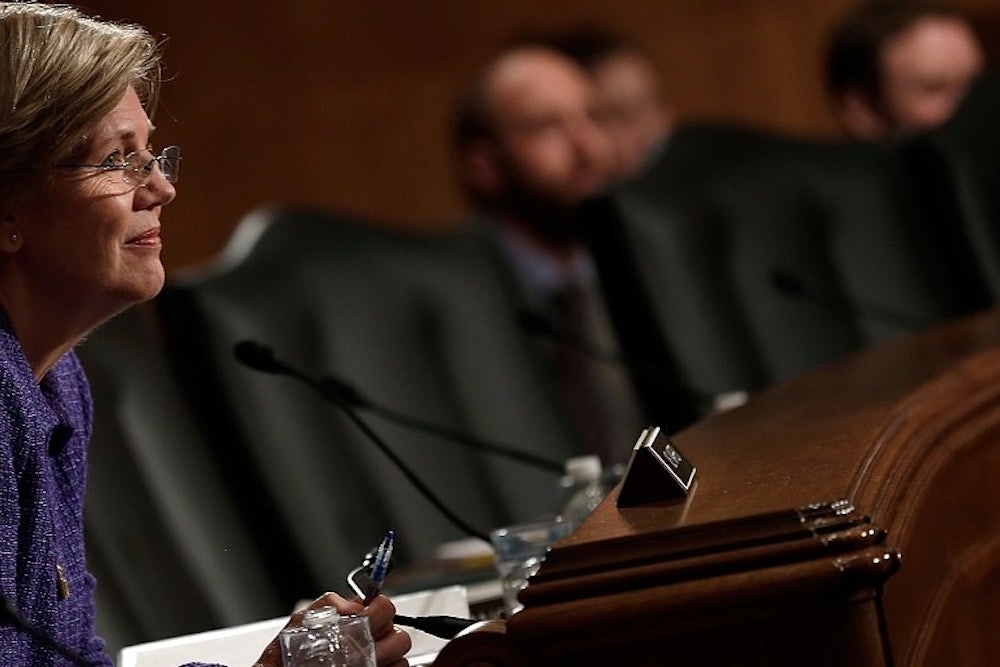In an interview with NPR’s Steve Inskeep that aired Monday, Massachusetts Senator Elizabeth Warren repeatedly dodged whether she intends to run for president, saying that she “is not running for president.” That’s been her line for months, but it only makes clear that she's not running for president at this moment; it says nothing about her future plans. Inskeep pressed her on that point. “I am not running for president,” Warren said again. “You want me to put an exclamation point at the end?”
But she didn't say "I will not run," leaving the door open a crack. And really, why wouldn’t Warren run? On that, there aren’t many good answers.
If Warren was confident that other Democratic candidates would offer her populist message, she could comfortably forego a run. But as was made clear last week, she is the best person in the Democratic Party at rousing the base and attacking Wall Street—no other potential challenger to Clinton, whose close ties to Wall Street mean she’s not likely to tack left and rip the banks, has Warren's star power or influence. So if she doesn’t run, that anti–Wall Street message may get lost.
Make no mistake, Warren's views differ significantly from those of the Democratic establishment. Two events in the past week made that clear: She has led the charge against Antonio Weiss, President Barack Obama’s nominee for the number three position at Treasury, because he worked at an investment bank and against the policy rider in the government funding bill that eliminated a provision in Dodd-Frank that prevented investment banks from using taxpayer-backed money to trade in complex, risky swaps, a financial product. The first issue has put her in conflict with the White House. On the second, she and the White House agree that the policy rider is bad policy but disagree on whether it was worth killing the government funding bill over.
As I wrote on Friday, these high-profile, intra-party fights offer great political appeal for Warren, and she has jumped on them effectively. Her speeches throughout the week earned national attention and had a real effect on the legislative process. Obama’s nominee may not be confirmed and the government funding bill barely passed. On Friday night, Warren took to the Senate floor to give a speech calling for the breakup of Citigroup and criticizing Wall Street’s influence over the executive branch. “Let me say this to anyone who is listening at Citi,” she said. “I agree with you: Dodd-Frank isn’t perfect. It should have broken you into pieces.” The YouTube video of the speech has nearly 300,000 views as of Monday morning.
So why wouldn't Warren run? Two reasons.
Presidential campaigns, including primaries, are extremely hard work on the body and brain. Warren will need a deep knowledge of issues beyond just the financial system. She’ll need to prove her knowledge about foreign policy, for instance, and will have to answer questions about whether she is experienced enough to lead the country. She'll also have to raise a boatload of money, which will be tougher without Wall Street's backing.
Also, Warren is almost certain to lose to Clinton. A recent CNN poll has Clinton leading her by 55 percentage points in a hypothetical matchup. If Warren entered the race, that gap would certainly close. But that’s still a massive amount of ground to makeup. For comparison, Clinton’s lead over Obama was already down to 10-20 percentage points in December 2006.
But Warren shouldn’t define success on whether she wins the nomination. Instead, she would be successful if she forced Clinton to move left, adopt a more populist message, and become less beholden to Wall Street. The events of the past week suggest that Warren has the power to do just that.
